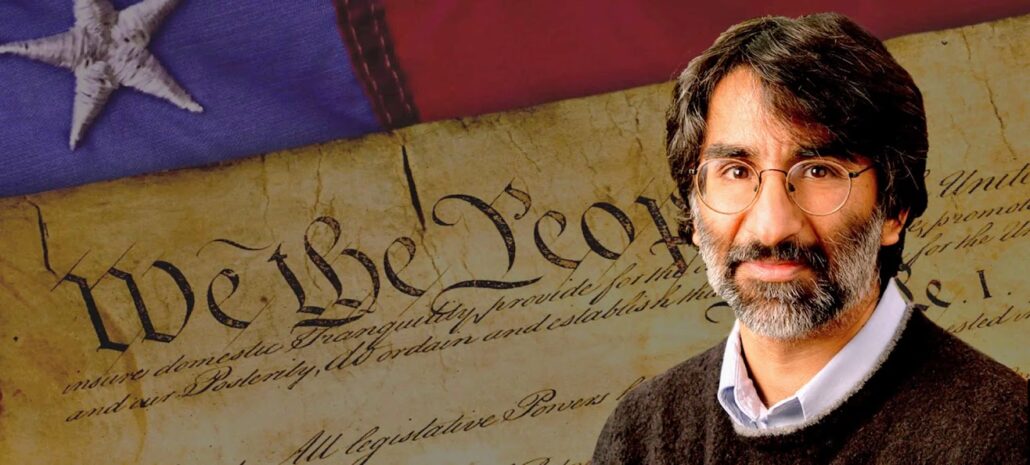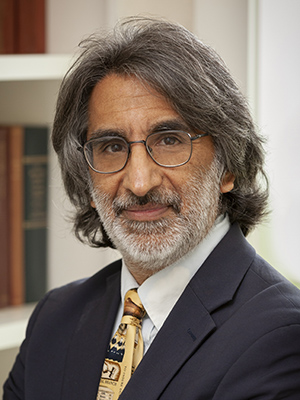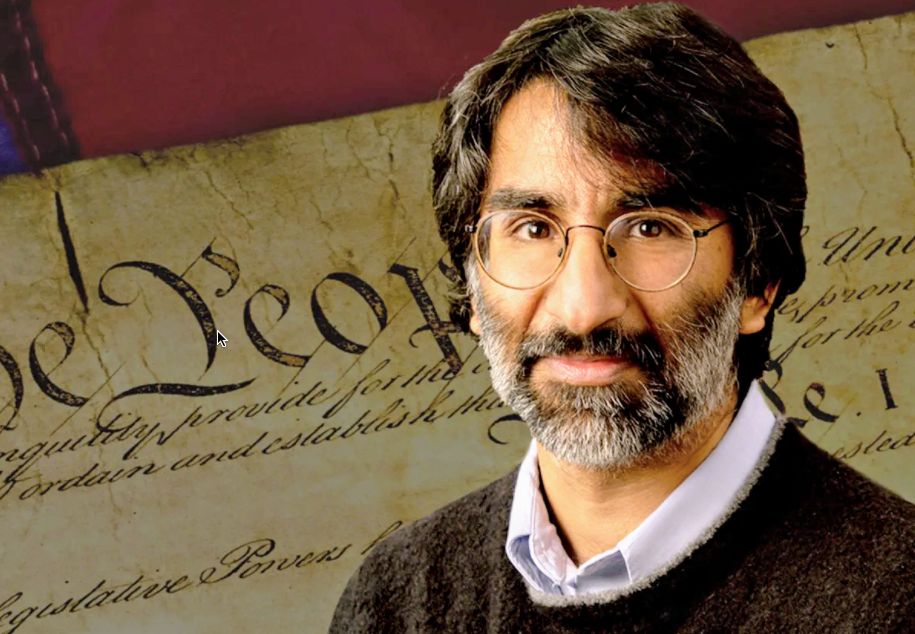Class Colloquium 6: Akhil Amar: The Presidency, the Vice-Presidency, and the Constitution
Editors Note: Akhil Reed Amar brings the US Constitution to life. Through his teaching, extensive writing, and popular commentary, he persuasively interprets our foundational document, energizing the text, literally enlivening it, in the context both of its original intent and its contemporary applications.
His work has won awards from both the American Bar Association and the Federalist Society, as well as the unofficial Triple Crown of Yale teaching: a Sterling Chair (scholarship), the DeVane Medal (teaching) and the Lamar Award (alumni service). See full bio at the bottom.
As this Covid-influenced season moves towards this year’s Fall Classic (The 2020 Election), our Class of ‘69 team is confident that its Colloquia lineup is getting even stronger in late season.
As evidence, our 6th star presenter holds the University’s unofficial triple crown: the Sterling Chair for scholarship, the DeVane Medal for teaching, and the Lamar Award for alumni service. He continues to set the standard for excellence.

Professor Amar offers his expertise on the topic that tantalizes and consumes all of us:
The Presidency, the Vice-Presidency, and the Constitution
He indicates that his research, especially into the Vice-Presidency, has uncovered trenchant insights and key concepts that promise to be meaningful and salient in a potential Biden administration, with the head of that ticket a former Vice-President and his trail-blazing VP choice, Senator Harris. The current President and Vice-President, Donald Trump and Mike Pence, will be compared and contrasted based upon their exercise of Constitutionally-granted powers. Given Professor Amar’s reputation for compelling, entertaining, and factual presentations, it promises to be a very lively event.
Our class is undertaking a unique concept in Yale Alumni history … confederating with neighboring ‘generational classes‘ … to share programming in appropriate instances. We will start by hosting the Classes of 1968-73 at this Akhil Amar lecture.
Since we anticipate upwards of 300 people attending this teleconference we are changing the format a bit: Professor Amar will present for about 45 minutes and then take questions for about 30 minutes. Plan for a 75 minute session. Accordingly, we won’t have breakout groups this time, although we are preparing for future Zoom breakout groups with even more flexibility (and security). So, register now and don’t miss out.
Details About The Program
Professor Amar will address ‘the central issue’ important to both the Left and the Right, namely: Expansion of Executive Authority. Since World War II, the Executive branch has usurped and assumed authorities assigned by the Constitution to Congress.
Consider:
 The growth in numbers and scope of Executive Orders;
The growth in numbers and scope of Executive Orders;- Signing statements that modify mandates central to Congressional Legislation when signed into law;
- The de facto use of “Commander in Chief” powers to effectively declare war, ignoring the War Powers Act.
- Usurping Congressional delegation on major decisions normally assigned to “independent” commissions (e.g. FTC, FCC) and departments whose assigned purpose is creating and implementing policies on immigration, trade/tariffs, public health, monetary policy, banking regulation, and many more;
- Executive redirection of resources that Congress approved for one purpose (e.g., defense) for another (e.g., The Wall);
- Invoking the Insurrection and Sedition Acts to federalize martial intrusions and criminal prosecution of often peaceful protesters.
- Plenary power to pardon, most disturbingly in areas of potential Presidential misconduct;
- Unilaterally changing personnel in the Executive branch, circumventing Senate confirmations, invoking legislative restrictions( the Hatch Act), waiving required security clearances, dismissing Congressionally-approved Inspectors General, appointments made absent appropriate training and qualification, etc.
Is the expansion of such Executive Authority, under any Administration, good for Democracy and Constitutional? This expansion of Constitutionally granted powers seemingly stands in stark contrast to the ‘Originalist’ interpretation the current Executive has applied to judicial appointment and interpretation.
Scheduled just a week before the 2020 election, it is certain this topic will be HOT, and Professor Amar is the world-class expert to help our understanding!
Click to register for this meeting:
https://zoom.us/meeting/register/tJMtce6hqDIrHdy9qiGfCRnjmJnqUUyu4ENt
After registering, you will receive a confirmation by email containing information about joining the meeting.
We will start promptly, so please JOIN the meeting 5-10 minutes early.
I hope you can attend. Don’t forget to register and mark your calendars.
Last, if you have any questions for our speaker, you can leave them on this quick-survey form.
BTW, if you haven’t used Zoom yet, Editor Wayne Willis has written a little how-to article to help you get over any technical concerns or questions; and if you need some personal support, he’s happy to call you and walk you through getting set up … for reasons outlined in that article. Just ping him at support@Yale1969.org.
About The Speaker
 Akhil Reed Amar is Sterling Professor of Law and Political Science at Yale University, where he teaches constitutional law in both Yale College and Yale Law School. After graduating from Yale College, summa cum laude, in 1980 and from Yale Law School in 1984, and clerking for then Judge (now Justice) Stephen Breyer, Amar joined the Yale faculty in 1985 at the age of 26.
Akhil Reed Amar is Sterling Professor of Law and Political Science at Yale University, where he teaches constitutional law in both Yale College and Yale Law School. After graduating from Yale College, summa cum laude, in 1980 and from Yale Law School in 1984, and clerking for then Judge (now Justice) Stephen Breyer, Amar joined the Yale faculty in 1985 at the age of 26.
His work has won awards from both the American Bar Association and the Federalist Society, and he has been cited by Supreme Court justices across the spectrum in more than three dozen cases—tops in his generation. He regularly testifies before Congress at the invitation of both parties; and in surveys of judicial citations and/or scholarly citations, he invariably ranks among America’s five most-cited mid-career legal scholars.
- He is a member of the American Academy of Arts and Sciences and a recipient of the American Bar Foundation’s Outstanding Scholar Award.
- In 2008 he received the DeVane Medal—Yale’s highest award for teaching excellence.
- He has written widely for popular publications, including The New York Times, The Washington Post, The Wall Street Journal, Time, and The Atlantic.
- He was an informal consultant to the popular TV show, The West Wing, and his constitutional scholarship has been showcased on a wide range of broadcasts, including The Colbert Report, Up with Chris Hayes, Tucker Carlson Tonight, Morning Joe, AC360, Your World with Neil Cavuto, 11th Hour with Brian Williams, Fox News @Night with Shannon Bream, Fareed Zakaria GPS, Erin Burnett Outfront, and Constitution USA with Peter Sagal.
- He is the author of dozens of law review articles and several books, including
- The Constitution and Criminal Procedure (1997),
- The Bill of Rights (1998—winner of the Yale University Press Governors’ Award),
- America’s Constitution (2005—winner of the ABA’s Silver Gavel Award),
- America’s Unwritten Constitution (2012—named one of the year’s 100 best nonfiction books by The Washington Post),
- The Law of the Land (2015), and
- The Constitution Today (2016—named one of the year’s top ten nonfiction books by Time magazine).
- In 2017 he received the Howard Lamar Award for outstanding service to Yale alumni. He is Yale’s only currently active professor to have won the University’s unofficial triple crown—the Sterling Chair for scholarship, the DeVane Medal for teaching, and the Lamar Award for alumni service.

